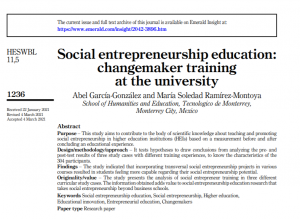Social entrepreneurship education: changemaker training at the university.
A study has been made to to contribute to the body of scientific knowledge about teaching and promoting social entrepreneurship in higher education institutions (HEIs) based on a measurement before and after concluding an educational experience. It indicated that incorporating transversal social entrepreneurship projects in various courses resulted in students feeling more capable regarding their social entrepreneurship potential.
Changemakers are active and resilient social entrepreneurs or innovators who can design and implement innovative solutions for social and environmental problems. Since 1980, Ashoka has been an example of a training platform for social entrepreneurs with a vision that goes beyond training, becoming a global community made up of the Ashoka Fellows.
Higher education institutions (HEIs) have increasingly been engaged in promoting education for social entrepreneurship. In recent years, several trends and pedagogical practices for social entrepreneurs’ training have emerged, bringing new challenges to the academic sector. HEIs are challenged to provide training in skills for the knowledge economy, develop creative thinking, promote entrepreneurship and make a social impact. Current university education must equip students to understand the new economy and react swiftly to its socioeconomic crises. Businesses and other organizations must be ready to mitigate social and environmental problems. Therefore, training programs should focus on students’ awareness of social welfare while developing business-and-public sector logic to implement problem-solving actions. Although studies investigate university best practices in social-entrepreneurial training, more studies are still needed.
You can download the paper HERE.
Image from Edwin Andrade
This publication has been prepared within SENBS project No. 2020- 1-EE01-KA204-077999. The content of this publication is the sole responsibility of the project coordinator and may not always reflect the views of the European Commission or the National Agency.


















Leave A Comment